Advertisement
A Tale Of Three Cities: Budget Cuts Around Mass.
Resume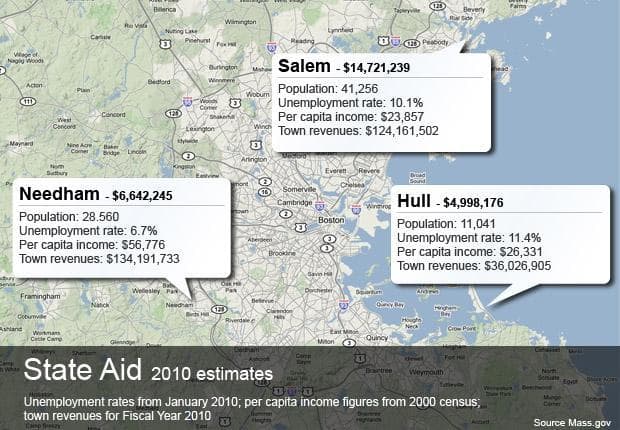
Once again, cities and towns are being told to expect less from the state. Leaders in the Legislature are telling municipalities to prepare for up to a 4 percent cut in state money in the new fiscal year. Three of our reporters traveled to three different communities to see how they're coping with cuts.
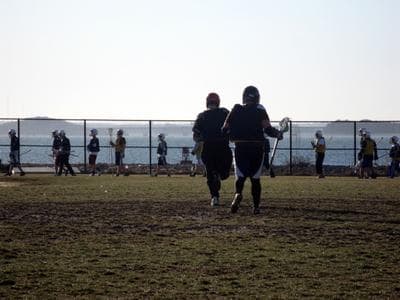
The most scenic playing fields in Massachusetts are at Hull High School. They are surrounded on three sides by water. Off the point, yards from shore, is Peddocks Island. Across the harbor on another side is the Boston skyline.
Here, under the giant blades of the windmill that looms over the high school, the boys varsity lacrosse team is holding its first outdoor practice of the year.
This year, the team, like every team at Hull High, is getting no money from the school's athletic budget — because there isn't any athletic budget.
“Our budget went from approximately $260,000 to zero,” athletic director Jim Quatromoni says.
Even so, the town kept all its high-school sports going. Adults volunteered as assistant coaches and students ran beach parking lots over the summer, sold calendars, worked concession stands and carnivals. The biggest fund-raiser?
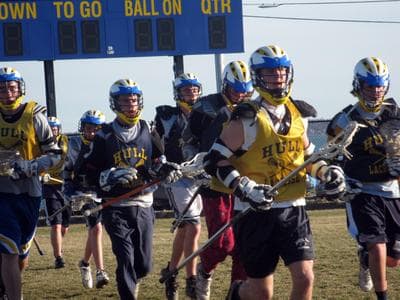
“I think the big one was the, uh, regrettably, the meadow muffin,” Quatromoni says. “We marked off the football field in 2,500 squares with field paint. We sold the deeds to each square, turned a cow loose and waited for them to produce an award-winning meadow muffin.” He laughs. “That in itself generated about $20,000.”
Quatromoni says, in all, the high school raised $120,000 for sports.
“You almost want to feel as though you've accomplished something," Quatromoni says, “but I'll tell you that it's hard to do that because this is not a sustainable model here. To expect people to raise upwards of $120,000, I think, in the end, is not realistic.”
In May, voters will decide whether to override proposition 2 1/2 and restore lost funding to the schools by raising property taxes. It will be a tough sell, because this is not a rich town. At least sports have been able to keep going.
School committee secretary Marianne Hart says the schools are down to about 100 teachers now. “We've lost about 40 positions over the past three years,” Hart says. “We are just being cut, cut, cut, cut, cut.”
Hart and fellow school committee member Kathy Bowes recount some of the cuts.
“We've lost social studies teachers at the middle school, technology at the high school, business at the high school," Hart says. "We've lost an assistant principal at the middle school."
“Foreign language at the middle school,” Bowes interjects.
Outside the high school, one by one, the boys varsity lacrosse players come up to coach Chris Weber at the equipment truck. Some adjust the helmets donated by the youth lacrosse program.
“Sorry I didn’t come yesterday on time,” one of the boys says sheepishly.
The playing fields are busy now, but unless the town raises its property taxes, next year they could become just another part of the scenery.
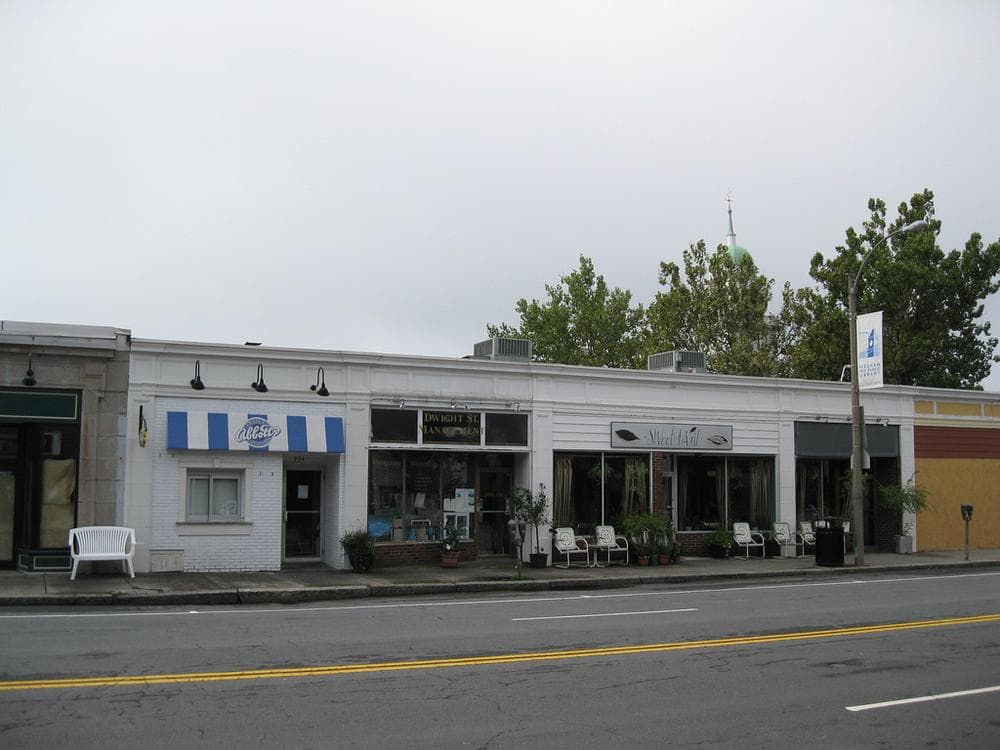
Town manager Kate Fitzpatrick describes the budgeting process in Needham as consistent and steady.
"Needham is a conservative community financially," she says. "It’s a conservative approach."
So conservative, the town has already budgeted for a 10 percent cut in state aid next year, even though the Legislature’s only talking about half that. But Fitzpatrick says Needham has to be prepared for the worst. She knows this year’s drop in state money won’t be the last.
"We’re calling it the bridge to 2013," Fitzpatrick says. "We’re trying to get to 2013 when we expect the economy will start turning around."
Needham is not poor. Located on Route 128 and on the commuter rail into Boston, the town appeals to families and businesses. Inside a busy stone hearth pizza restaurant on the town common, Chris Donahue, from Lynn, is surprised by how well businesses here seem to be doing.
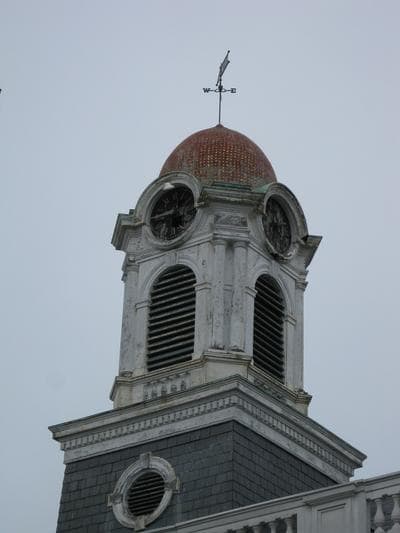
"Just by the stores and everything around, there’s a difference right there," he says. "In Lynn, it’s hurting. Here it doesn’t look like it’s hurting too bad."
At the next table, Frederica Lalonde doesn’t disagree. She moved to Needham five years ago.
"I think that’s the biggest thing I’ve noticed about Needham residents, is that they take pride in the town," she says. "Anything that the town needs, they rally to get it done."
At the same time other towns have been rejecting property tax increases, Needham has been approving them. Just this past December, the town said yes to another tax hike — to pay $17 million to renovate an elementary school.
But that taxpayer support doesn’t mean the school district budget has been building, too.
Anne Gulati is in charge of finances for the Needham Public Schools. The district is cutting four jobs next year, even though it has enough money to pay for those teachers. The schools got $1.8 million in federal stimulus funds. Gulati says it would be mistake to spend that money to keep people on, with no revenue to keep them on long-term.
"We’ve looked at those monies not as a one-year shopping spree, if you will, but sort of a bridge," she says. "Help us get where we need to be."
The rest of Needham town government instituted a hiring freeze and was able to avoid job cuts in next year’s budget. Town workers may be keeping their jobs, but they did give up a cost of living increase.
Steady as she goes.
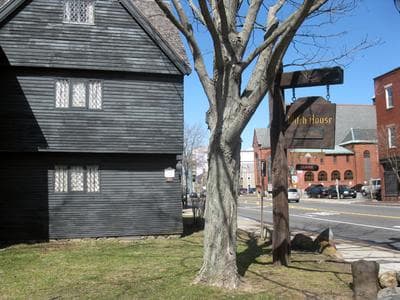
One of the best known cities in the state, Salem has 2,000 businesses and attracts about one million visitors each year to its waterfront and witch attractions.
But Salem Mayor Kim Driscoll is frustrated by repeated budget shortfalls. This year's, she says, is the worst. "We've been making cuts, consolidating, privatizing, trying to find ways to improve efficiencies since I've gotten here," she says. "Eventually you get to the bone and that's where we're at."
If lawmakers agree to the 4 percent reduction in local aid next year, Salem would have to cut almost $1 million more. Driscoll is considering several things and perhaps the one she is most adamant about is having city employees pay higher health insurance co-payments.
Driscoll says boosting their $5 copays to $15 would bring in more than $1 million.
"We've already suffered numerous layoffs, we've had early retirement incentives," she says. "I'm down 15 police officers. I'm not at a point where I can really lay off officers. At the same time, I can't afford to maintain a $5 co-pay for them. Nobody has a $5 co-pay anymore, or very few people."
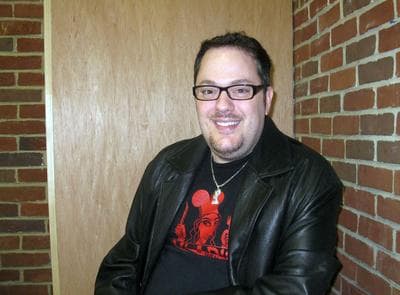
So asking folks to pay a little more to keep jobs in the city, police officers on our streets — I don't think that's asking too much," she concludes.
Driscoll suggested increasing health insurance co-payments last year, but all eight of the city's unions rejected it. Although union leaders declined to comment, what many of them said last year was that they had already agreed to pay a higher percentage of their total health care costs, and it's up to the city to come up with creative solutions.
So now Driscoll is asking the state for authority to bypass the union collective bargaining process.
She is also thinking about closing a school and increasing local meals and hotel taxes. That's not going over well either.
Salem Chamber of Commerce Executive Director Rinus Oosthock says businesses agreed to a higher tax rate last year. "Businesses are hurting already and that includes restaurants and hotels," Oosthock says. "I think by adding another tax you're essentially inviting people to go out of business."
But despite the economy, some Salem businesses are booming. Christian Day owns Hex, a witchcraft and magic shop, and he's about to open a psychic reading storefront down the street. He says Salem businesses already pay their fair share and bring in a lot of money to city coffers.
"People come to Salem in droves because they want to see the witches and they want to believe in magic again," he says. "They want that wonder they had as a child to believe in something so strongly that they can make it happen through sheer force of will alone."
Mayor Driscoll might need a little magic this year to figure out how to balance her budget.
WBUR's Fred Thys reported from Hull, Curt Nickisch reported from Needham and Deborah Becker reported from Salem.
This program aired on March 18, 2010.